The History Of Generations
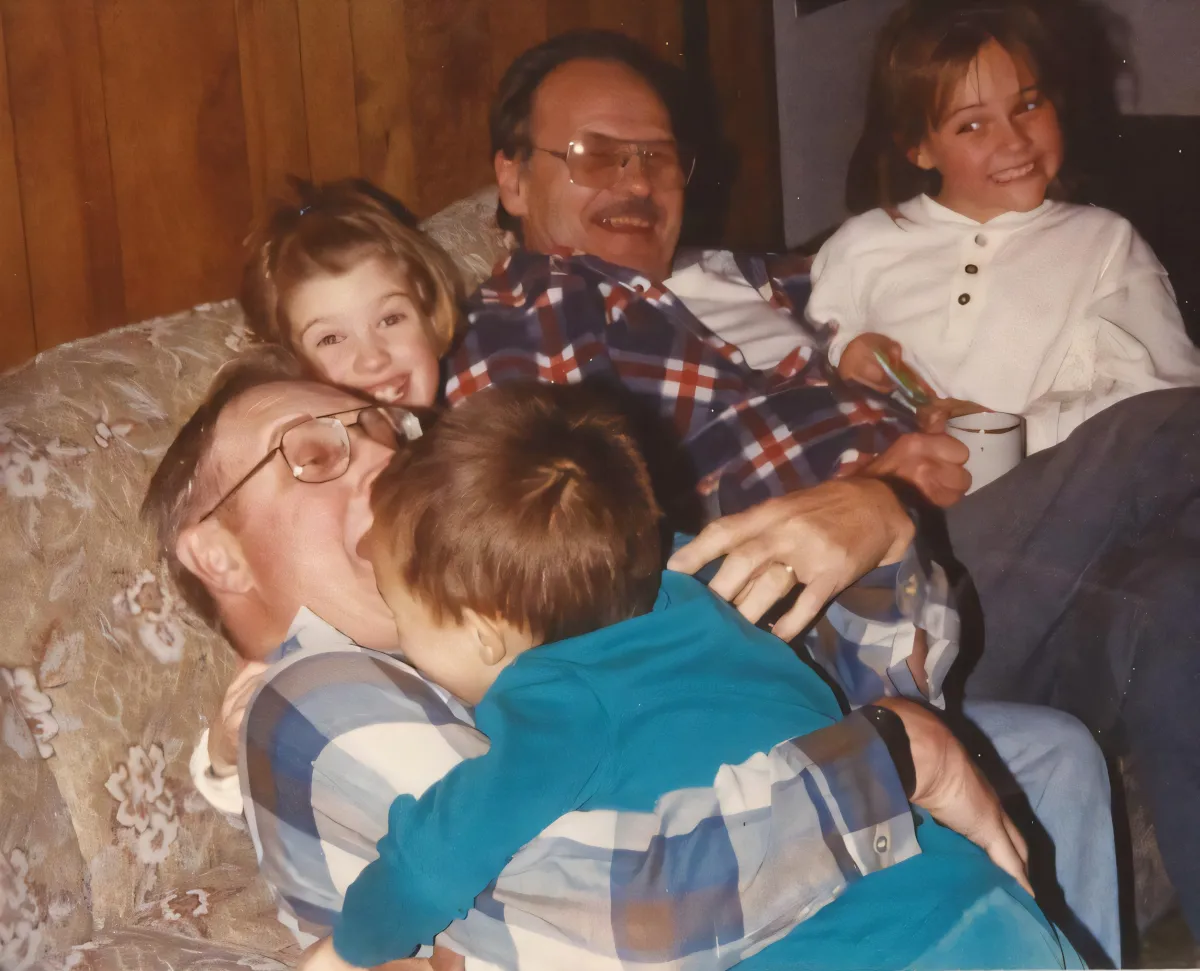
History doesn't repeat itself, but it sure does rhyme. The average lifespan of a human today is roughly eighty years. That time span is enough to see changes in the world but falls short of seeing those changes follow through along with the consequences that arise.
There are patterns in our history that are too obvious to ignore. The story behind generations could be a puzzle piece to those patterns.
Explaining the History of Generations
The grouping of peoples born in the same time block of history has only been studied and discussed for a short period of time. The idea of generations started swirling around in the 1860s when French philosopher Emile Littré coined the notable term:
"[Generations are] all men living, more or less, at the same time."
While this sums up what a single generation is, it wasn't until over a hundred years in the future that this topic was put under a microscope.
Generational Theory
Authors William Strauss and Neil Howe began analyzing generational trends throughout history which culminated in their first collaborative book "Generations: the History of Americas Future 1584-2069" in 1991 and the follow-up titled "The Fourth Turning" in 1997.
These books take a look at the relationship between generations in the span of a saeculum.
What is a saeculum?
A saeculum is roughly a century. The generations that live and die within that time span are the inhabitants of that saeculum. According to Strauss and Howe, there are 4 turnings within a given saeculum, much like seasons to a year.
Here's a basic example of what a saeculum is:
Let's say a village was founded by a group of 1,000 settlers. There is a healthy mix of the elderly, young to mid-life adults and adolescents/infants within the settlement.
The very day the village was founded is the day the saeculum starts. The day it ends is when the last of the newborns draws their last breath, leaving no one from the first day of the village alive.
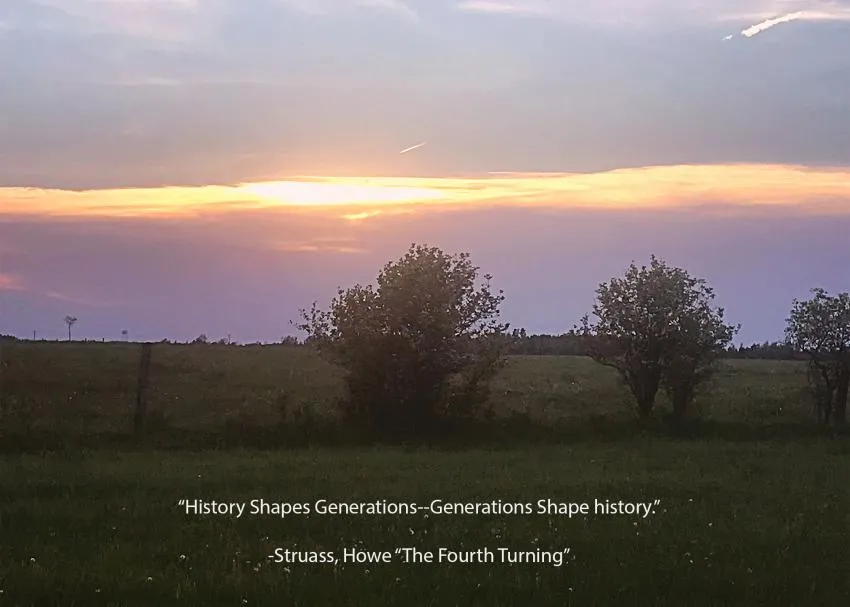
The Four Turnings
How and when these turnings occur affect each generation differently. Here is Strauss and Howe's idea of what they are.
The High:
A time of prosperity and economic growth. The high occurs after a crisis. Within that crisis, society is forced to rally together and put their individualism aside in pursuit of one common goal: survival.
Institutions established during the crisis are strong and are essentially the consensus on how the society should be run.
The Awakening:
The children born during the high have no recollection of the crisis preceding them. They were born in a time of good spirits and strong institutions.
However, they don't understand why those institutions are there in the first place and begin to question the previous generation's formula for success over the crisis.
The Unraveling:
With previous institutions questioned, they begin to weaken. The generations that came together in the time of crisis are either dead, in their twilight years, or in middle age. The future starts to lie in the hands of the generation born after the crisis.
The Crisis:
This turning can either stem from the events during the awakening and the unraveling. This event is a sudden shock to society: that of destruction, tragedy, or both.
The institutions set during to previous crisis are now obsolete and society to do a hard reset.
The peoples born after the previous crisis are now at the apex of their lives. the young adults who weathered the crisis are now too old, unable to do anything but just watch as society goes through the climax of the current saeculum.
The collective victory over the crisis thus ushers in a new saeculum starting again with the high: repeating the cycle.
The patterns don't stop there
People born during each of the four turnings earn an archetype. This archetype is their role in society that will play out in each of the turnings.
The Four Archetypes
According to Strauss and Howe, there are 4 archetypes to generations. Which archetype a generation receives is dependent on which turning they were born.
Prophet:
Born after a crisis. They came of age in a time of little cultural and civil turmoil and brought up in strong institutions.
They are most likely to be the catalyst of the awakening, questioning the previous institution established. As children, they are rigorously protected by their parents who were 1st hand witnesses and heroes of the crisis.
The most recent example would be the Baby Boomer generation. They were born after the greatest war in history: World War II. Veterans of the war came home reaping the benefits of their valor.
The G.I. bill was instrumental in making America what it is today. The bill gave (mostly just white soldiers) a chance to buy homes at low interest and pursue higher education or trade at little to no cost.
Soldiers were coming home to houses, well-paying jobs, and opportunities to start a family-- thus creating the suburban sprawl. Boomers were the first to experience childhood and adolescence in this new era.
By the time they reached adulthood, they came to loath it.
Nomad:
A sort of a rebellious teenager of a given saeculum. Born during the awakening period when the prophet era is starting to have kids while questioning their institutions. Society is having a collective look in the mirror.
This generation does not need to search for individualism, they are born into it.
This generation is overlooked, tugging at the shirts of the older generations as they clash about how society should be run. Individuals fight the conformists while the children are left home alone to fight boredom.
They adapt, react, and move to an ever-changing ever-decaying culture
that's crumbling right in front of them. They have never seen a strong economy or a balanced society.
Gen X is the most recent example.
Born during the Civil Rights movement and the Vietnam war, Generation X came into a world starkly opposite to the Golden Era of Capitalism and Post War bliss of the mid-40s through 50s.
Families were split, more parents were working, racial inequality and injustice were at a boiling point, and the Vietnam war wasn't being fought because "It was just the right thing to do."
Turmoil stemming from economic and cultural uncertainty are the only things nomads know.
Hero:
Born during the unraveling, their innocence is shrouded in a tense cultural stand-off and rapidly growing distrust in government. As children, they are unaware of the dangers that lie ahead.
However, when the crisis happens, they will the first ones called to action. They will come of age by the time the crisis is in full effect and will be on the frontlines fighting whatever the crisis is: disease, war, etc.
The crisis will influence them to trust in institutions that helped combat the crisis.
Artist:
These are the fragile babies of the crisis. Too young to do anything, some too old to forget. This generation is usually overprotected by their parents in reaction to the recent crisis.
This overprotected generation grows up in a rigid institution that was created in place of the crisis. They tend to be more sensitive and conforming to the institutions set in place.
Here is a brief explanation of the theory from author Neil Howe:
Generational Theory predicting America's turmoil
Of course, human life is much too complex to just categorize generations by certain times within the century they lived. Each century's technology increases, speeding up not only our daily lives but our place in history as well.
However, when this theory was applied to the near future, the outcome produced some scary-accurate results.
The book "The Fourth Turning" was released in 1997. Here is an excerpt from the book:
Around 2005, a sudden spark will capitilize a crisis mood-- economic trust will implode. Real hardship will beset the land with questions of class, nation, race, and empire.
The authors go on to say:
Sometime before the year 2025, America will pass through a great gate in history commensurate with the Civil War, Great Depression, and WWII.
As we navigate our way in the year 2021, this theory holds some shocking weight 24 years after it the book was published.
The authors state the fourth turning began in 2008 with the housing crisis. While it can be argued that 9/11 is the genesis of the current crisis as the entire nation, along with the whole world, changed its collective mood and outlook.
The War on Terror began in response to the September 11th attacks while a steep rise in hate crimes against Muslims ushered in a new era of xenophobia.
Soon after, the housing crash in 2008 ensued.
Questions of police brutality and systematic racism were brought to the forefront of America's deep-seated issues in the 2010s. These events and issues caused a massive rift in the country as views became more divided than ever.
With domestic terrorism, an ever-looming threat, by the end of the decade almost no one trusted each other.
Entering a new decade we have come to the climax of the crisis, the very part responsible for our travel through "the great gate in history." The antagonist: COVID-19.
COVID-19: The end of the current saeculum
COVID-19 brought our society to the final turning point. Everything before March 16th, 2020 seems to be in the distant past. The normal we knew yesterday will not be the norm tomorrow.
The "Good 'Ole Days" are dead, disassembled, and burned in the wake of a new millennium. The decline of America starting in the 1980s is now culminating with the pandemic, showing its deep disfunction and growing division.
The structures set in place combating this crisis will show long after pandemic status is lifted.
By Strauss and Howe's theory, after this crisis passes (around the end of the decade) a new saeculum will begin, ushering a new high. The cycle begins and the process repeats itself.
Only time will tell to see if the theory holds up, although, one thing can be said. The world will experience a new era post-COVID-19.
We are not past COVID-19, however. The battle continues.
The 4 archetypes and their role during the crisis
Baby Boomer-Prophet: Born Post-WWII, they are now the elder leaders finally facing a crisis after being born in the "Golden Era" of America.
According to the Library of Congress, the average age of Congressman in 2020 was almost 58; Senators 62. This means Baby Boomers are the ones making decisions regarding this pandemic and its subsequent issues.
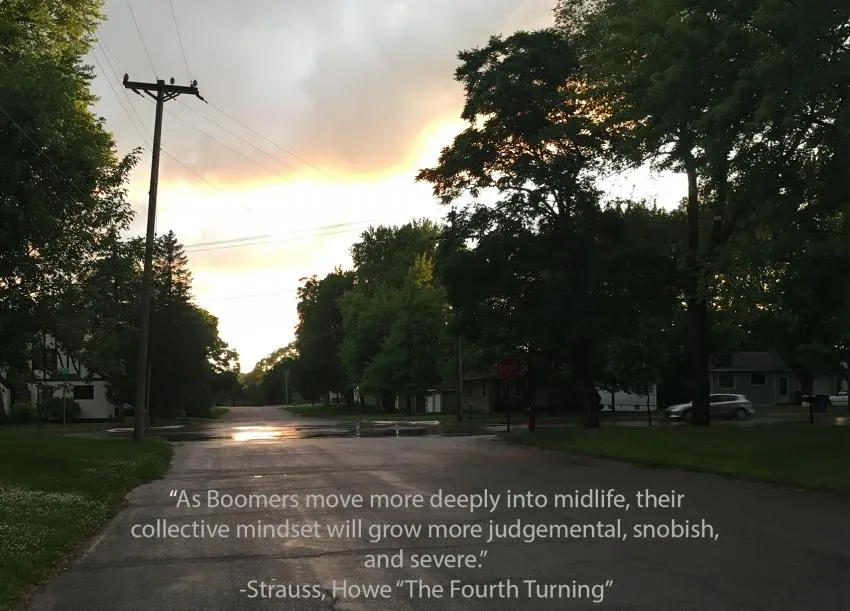
Generation X-Nomad: This generation was born during the awakening of Vietnam and the Civil Rights movement.
Baby Boomers were young and fighting the system, while this young generation was given a key and an empty house.
Generation X coincides with the nomad's description. As they grow up with institutions beginning to weaken while they come of age during the tumultuous 1990s (the unraveling,) Generation X has known no stability.
Both of my parents have bounced around in their lives, either for jobs or a change in scenery. They don't like to stick with the same line of work for too long and are almost always on the move.
This is a generation hardened by America's decay; which will show long into their elderly years.
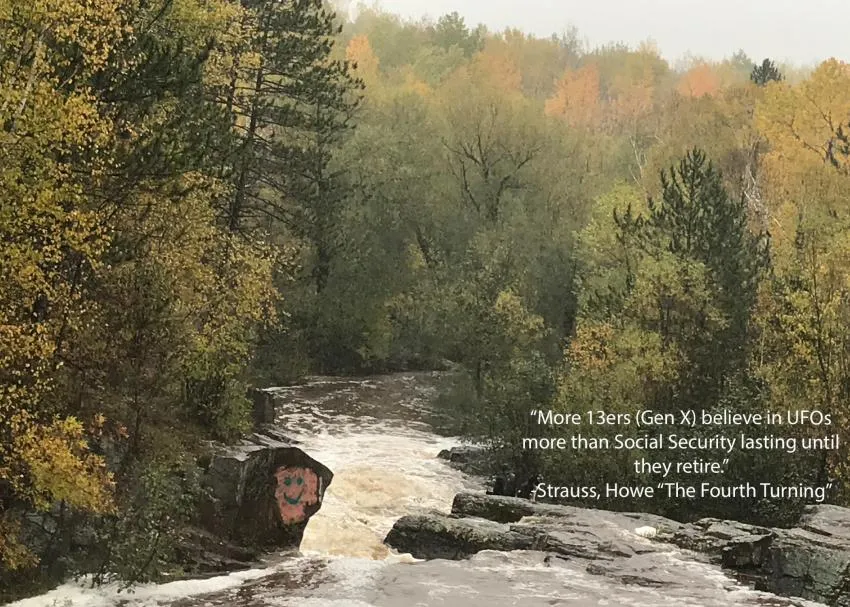
Millennials-Hero: With 1980 being the earliest birthdate for Millennials, this generation started coming of age during the unraveling. A large portion of Millennials came of fighting age during the Iraq war.
The older millennials were grunts fighting a war overseas as they were led by Baby Boomers.
Now as the second half of millennials were kids during the Iraq War, they might have also seen their parents lose their house in 2008. The imbalance of wealth is at the highest it's ever been leaving many Millennials in tens of thousands of dollars in student loan debt.
Millennials who chose a healthcare career path have started in the most challenging time for healthcare workers in almost 100 years.
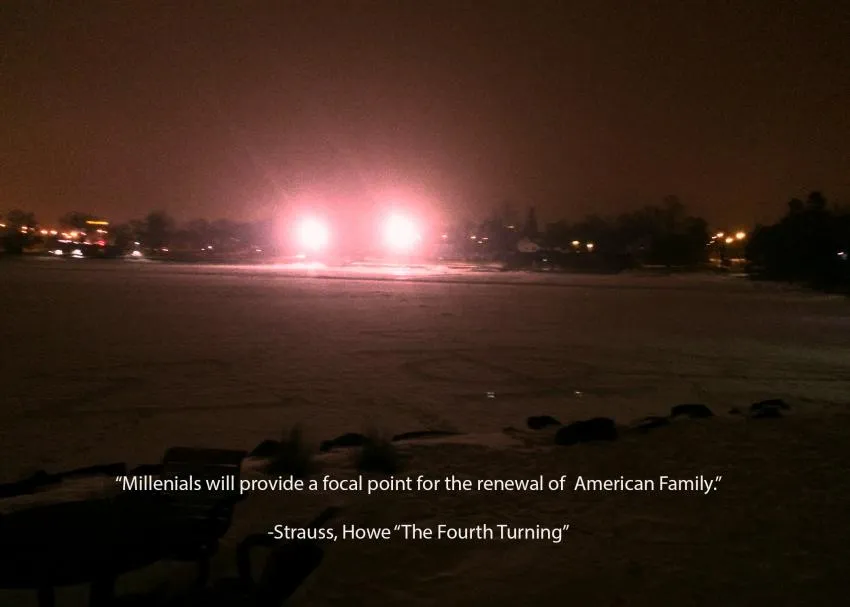
Gen Z-Artist: With Gen Z being just infants during 9/11 and adolescent young adults through the 2020s, this generation may not know anything crisis for the first part of their lives.
They were born in a world of fear, radical violence, and egregious corruption. Their parents being overly protective caused them to become sensitive to the growing issues that arose in the 2010s.
Issues regarding race, mental health, and gender identity we see today are the culmination of Gen Z's youth and the horrific events that unfolded during that time.
The Next Generation
We won't really know what the next generation will be like until at least a decade from now.
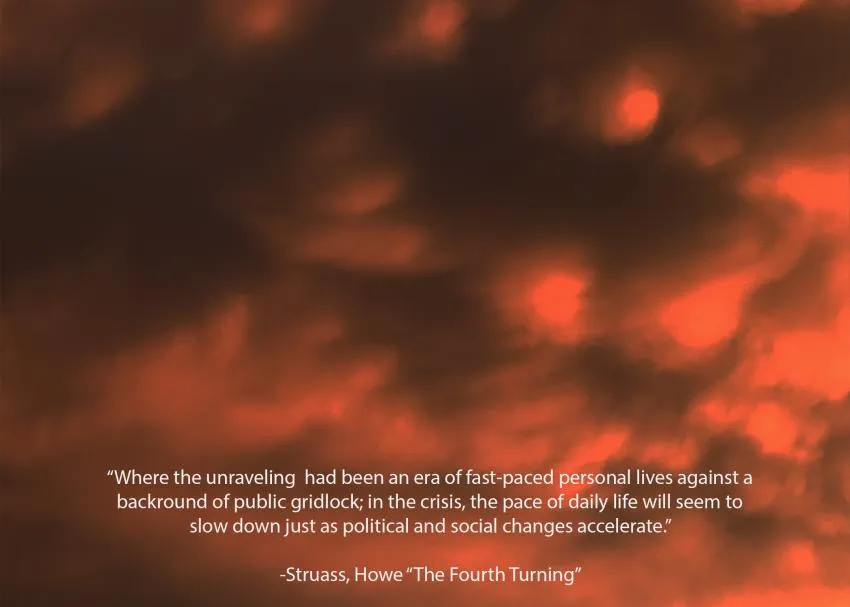
If COVID-19 and other societal issues resolve. It's only a matter of time before a generation is born into a world with a vastly different trajectory. They will not have personally went through a crisis and will not know of one until near the end of their life.
According to the theory anyway.
With technology rapidly growing and the economy globalizing, it's hard to say whether this theory will withstand the test of time.
While this theory is called pseudoscience, applying it to other centuries proves to match some key elements. This might just be a glorified horoscope in the grand scheme of things. However, applying this theory to history's patterns carries weight.
Time, as we perceive it, is linear. Time has a beginning and an end. Although, cyclical events help us perceive time within a linear realm by creating patterns within to show the passage of it.
These cyclical events can match up with history, giving us the seasons of our civilization.
Opinions and Perspectives
Watching these patterns unfold in real time during COVID has been quite eye-opening.
The concept of four turnings provides a useful framework for understanding historical change.
This explains why different generations have such varying views on authority and institutions.
The theory really captures how each generation is shaped by the events of their formative years.
Looking at history through this lens helps explain a lot about current events.
The parallel between natural cycles and societal changes is quite profound when you think about it.
This framework helps me understand why my generation approaches problems the way we do.
The description of Gen Z as artists really fits with their creative approach to social change.
Interesting to think about how these cycles might manifest differently in different parts of the world.
The theory helps explain why different generations have such different approaches to work and life.
Being part of the Nomad archetype explains a lot about my adaptability and skepticism.
The cyclical nature of history becomes more apparent when you look at it through this lens.
It's fascinating how each generation seems programmed to solve the problems created by previous ones.
Watching my kids grow up during this crisis period, I see how it's shaping their worldview.
The idea of a fourth turning crisis feels very real right now in our current situation.
I appreciate how the article acknowledges technology might change these patterns going forward.
The theory makes me think differently about how generational trauma gets passed down.
This helps explain why my parents and I have such different views on social institutions.
Working in healthcare, I've seen firsthand how different generations responded to the COVID crisis.
Amazing how they predicted major societal shifts decades in advance. Makes you wonder what's coming next.
The description of institutional trust erosion really hits home when I think about recent years.
I'm curious about how global interconnectedness might affect these cycles going forward.
Looking at my workplace, I can see how different generations approach problems differently based on their turning.
The theory might not be perfect, but it provides a useful lens for understanding generational differences.
Living through this crisis period has given me a new appreciation for how previous generations handled their own crises.
The way the article connects historical events to generational characteristics is quite compelling.
I've watched my children navigate these turnings so differently than I did. The theory helps explain why.
Comparing societal cycles to seasons makes it easier to understand why certain generations act the way they do.
What fascinates me is how these patterns seem to hold true across different cultures and time periods.
The article really captures how COVID-19 has accelerated many of the changes that were already underway.
I'm skeptical about some of these predictions. Humans have more agency than just following predetermined cycles.
My experience totally aligns with the Nomad archetype. We adapted to constant change because we had to.
The concept of institutional trust cycling between strong and weak periods really reflects what we're seeing today.
I find it interesting how each generation seems to correct for the perceived mistakes of the previous one.
The description of the current crisis phase is uncomfortable but accurate. We're definitely living through historic times.
As someone who works in education, I see these generational traits play out in how students approach learning and authority.
The theory explains why different generations often talk past each other. We're all products of our respective turnings.
Reading this made me better understand my grandparents' perspectives. They lived through completely different turnings than I did.
The parallel between seasonal cycles and societal turnings is quite elegant. Nature does tend to move in cycles.
I wonder how future historians will view these generational theories. Will they hold up over time?
The artist archetype for Gen Z makes so much sense when you look at their sensitivity to social issues and creative approaches to activism.
Actually, I think the Hero archetype fits perfectly. It's not about being traditional heroes, it's about being the generation that has to step up during crises.
The description of Millennials as the Hero generation feels a bit forced. We're more like cleaning up messes than being traditional heroes.
Looking at my Baby Boomer parents, I can totally see the Prophet archetype. They grew up in prosperity and really did question everything.
The theory might be oversimplified, but it offers an interesting framework for understanding historical patterns.
I work with people across all these generations, and I can definitely see these archetypal patterns playing out in real time.
Anyone else find it eerie how they predicted a major crisis would hit America before 2025? Pretty remarkable foresight.
The way COVID-19 is described as the crisis ending the current saeculum is spot on. Everything really did change after March 2020.
I'm curious about how technology might be breaking down these generational patterns. The rate of change is so much faster now than in previous centuries.
The article really nails the Gen X experience. We were definitely the latchkey kids watching society change dramatically during our youth.
Yes, that's exactly what I noticed too! I grew up with very protective parents and now I'm much more hands-off with my own kids.
What strikes me most is how each generation seems to react to the parenting style they experienced. Overprotected children become more independent parents, and vice versa.
The four turnings concept actually makes a lot of sense when you look at historical patterns. I've seen these cycles play out in my own lifetime.
I disagree with putting so much weight on these generational divisions. Many of us share experiences across these supposed boundaries. My older Gen X friends and I share many of the same values and challenges.
The concept of a saeculum is really interesting. I never thought about how generational cycles could align with century-long periods of history.
As a Millennial, I definitely relate to the Hero archetype description. We came of age during 9/11 and the 2008 crisis, and now we're facing COVID. It's like we're constantly being tested.
While I appreciate the theory, I think it's a bit too deterministic. Our world is far more complex now than it was in previous centuries. We can't just fit everything into neat generational boxes.
I find it fascinating how accurately Strauss and Howe predicted the 2008 financial crisis in their book. The way they described the unraveling of trust in institutions really resonates with what we've experienced.
